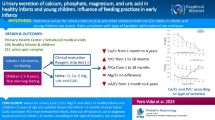Abstract.
In early infancy, complex disorders of acid base metabolism are more frequent than in any other age group, with a predisposition to metabolic acidosis due to an age-related low renal capacity for acid excretion and an unphysiologically high actual renal acid load in nutrition with common formulas. Recently in preterm and small-for-gestational-age infants, persistent maximum renal net acid excretion (NAE) with subnormal or normal blood acid base status, impaired weight gain, and adaptive hormonal reactions have been observed. Incipient late metabolic acidosis is one example of a mixed disorder of acid base metabolism with maximum renal NAE in early infancy. Alkali therapy is highly effective and can be realized both on an individual basis, using urine pH screening as a diagnostic criterium for maximum renal acid stimulation, or on a general preventive level using modified standard formula with a reduced actual renal NAE similar to that seen on alimentation with human milk. From an integrated point of view, the low glomerular filtration rate and renal capacity for acid excretion beyond the developmental age of more than 44 weeks, may well be interpreted as the result of a specific adaptation to breast feeding sparing energy, and thus an evolutionary advantage for the survival of mother and child.
Similar content being viewed by others
Author information
Authors and Affiliations
Additional information
Received July 10, 1996; received in revised form and accepted October 7, 1996
Rights and permissions
About this article
Cite this article
Manz, F., Kalhoff, H. & Remer, T. Renal acid excretion in early infancy. Pediatr Nephrol 11, 231–243 (1997). https://doi.org/10.1007/s004670050270
Issue Date:
DOI: https://doi.org/10.1007/s004670050270




